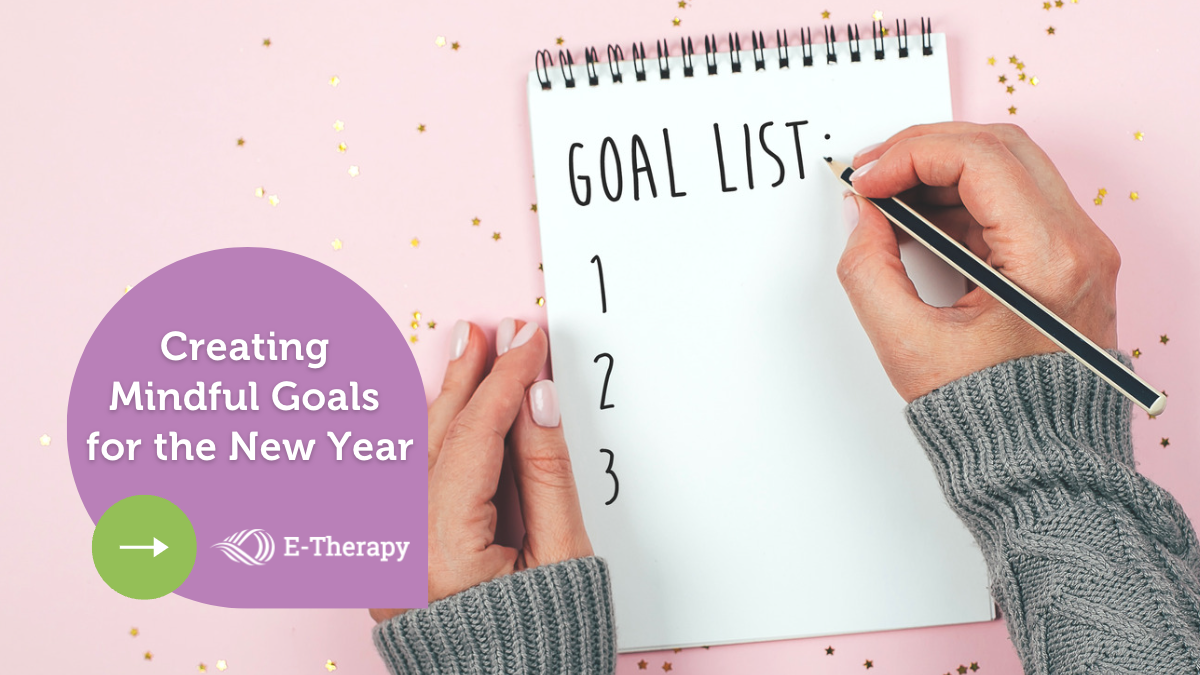 If you’re like many, you might find the start of a new year as the perfect time to take stock of your life to determine how you want to change the things around you as you move forward into the coming months. It can be a time to make big plans or grand resolutions. But, in all honesty, a lot of those “big plans” can be hard to accomplish for multiple reasons, and before summer has even hit. And maybe it’s because your goal or resolution was unrealistic or too broad. However, there are many ways to go about setting goals for the New Year or whenever you are needing a fresh start. If you’re looking for some guidance or where to start, one approach to think about this year is practicing mindfulness.
If you’re like many, you might find the start of a new year as the perfect time to take stock of your life to determine how you want to change the things around you as you move forward into the coming months. It can be a time to make big plans or grand resolutions. But, in all honesty, a lot of those “big plans” can be hard to accomplish for multiple reasons, and before summer has even hit. And maybe it’s because your goal or resolution was unrealistic or too broad. However, there are many ways to go about setting goals for the New Year or whenever you are needing a fresh start. If you’re looking for some guidance or where to start, one approach to think about this year is practicing mindfulness.
To be mindful
According to the Merriam-Webster dictionary, the definition of mindfulness is the practice of maintaining a non judgemental state of heightened or complete awareness of one’s thoughts, emotions, or experiences on a moment-to moment basis. When you’re mindful, you pay attention to what’s happening around you. This self-awareness can lead you to make better decisions for yourself rather than making decisions based on emotions, such as anger or sadness, that you might one day regret. When you become more mindful, you have the ability to control negative emotions. Also, by not dwelling on those emotions over long periods of time, you’re hopefully able to see them as temporary experiences and not part of who you are as a person.For more help on how to be more mindful in your daily life, visit our eCALM Room.
Mindful plans help reach goals
In order to be more mindful, it’s important to know your triggers, impulses, feelings and emotions. Also, you need to know your thoughts and beliefs. Lastly, you need to be aware of your actions and behaviors.
Build awareness around triggers and impulses
When you’re aware of and understand your triggers and impulses, that can aid in you purposefully setting your goals. Think of triggers and impulses as two sides of the same coin. They’re the same thing, but they work in reverse ways.Triggers are things that set off a response from you, whether it’s physical or mental. For example, if you have a hard time getting out of bed some mornings, maybe knowing that there is no breakfast in sight when you wake up may be enough to get yourself out of bed earlier than usual to get breakfast before you start your day. In contrast, an impulse is more like an urge that drives us towards something we want or need even if it goes against our better judgment or goals. For example, if your goal is to stop eating unhealthy meals before you go home from work every day because they make you feel sluggish, then knowing you’re going home soon could probably cause you to reach for another slice of pizza rather than a salad instead.
Find motivation to be true to values
Setting goals with a mindful approach will help you find encouragement to make choices that feel true to your values. While setting specific goals can help you achieve what you want, mindfulness offers an opportunity for reflection and evaluation along the way. Those goals are more than just a checklist of things you want to accomplish by the end of the year. Rather they are a representation of how you want to live in 2023 and after. Mindfulness can help with decision-making in many ways.
- Mindfulness helps you to better understand priorities and desires in order to make choices based on what really matters now as well as in the future.
- Mindfulness allows you to notice when you’re feeling stressed or rushed so you can hopefully avoid negative emotions like frustration or anger, which can cause pressure or poor judgment when trying new things.
- Mindfulness helps keep your brain calm during stressful situations, and especially after, so you’re able to react appropriately instead of reacting emotionally towards others who also may be feeling stressed.
Mindful goals are about achievements
They are about being more aware of how you live your life, how you interact with others, and how you feel about the world around you.There are many mindful goals you could set for yourself, including:
- Being more aware of the habits in your life that don’t serve you well – drinking too much alcohol or eating junk food – and finding new ones that do – exercising regularly.
- Learning to be kinder to yourself and acknowledging that it’s important to live a healthy and peaceful life.
- Learning how to take care of others without neglecting yourself. This can take time and practice, but it is crucial if you want your relationships with friends, family members or significant others to grow stronger over time.
Simplicity is key
- Make your goals easy to remember, do and track
- Goals should be specific, measurable and realistic
For example, “I want to meditate more” may not be a good goal because it’s too broad and vague. Instead, try “I will make time to meditate at least five times a week.” This is a specific goal because it can be tracked with the number of times you meditate each week.
Practice using mindfulness journals
Journaling helps you reflect on your life. It also helps you get more in touch with your emotions which can be helpful when setting goals that have emotional components. You can use a journal to track your progress in reaching those goals, being more mindful, and keeping yourself motivated through the process.
Put goals on paper
Put your goals in writing. Jot them down on a piece of paper, in a notebook, in your phone’s “notes” or in a spreadsheet. Wherever they are, make sure you have a hard or digital copy so that when the time comes to check in on them, they are easily accessible and visible.
- What do you hope to accomplish? Write down the goals you want to achieve.
- How will achieving those goals affect your life positively? What steps do you need to take in order for those changes to happen? Write down how you will attain those goals.
- For example, “I want to have better relationships with my family.” The next step might be something like, “I will ask them more questions about their day.” Writing things out helps clarify what action steps would look like if you were to try your hardest.
Mindfulness is powerful
In the end, it is important to understand the benefits of a mindful approach to goal setting. Creating mindfulness in your life is a powerful way to ensure that what you do every day brings meaning and happiness into your life. Take some time today to reflect on where you are with your goals and if they’re still meaningful to you.
